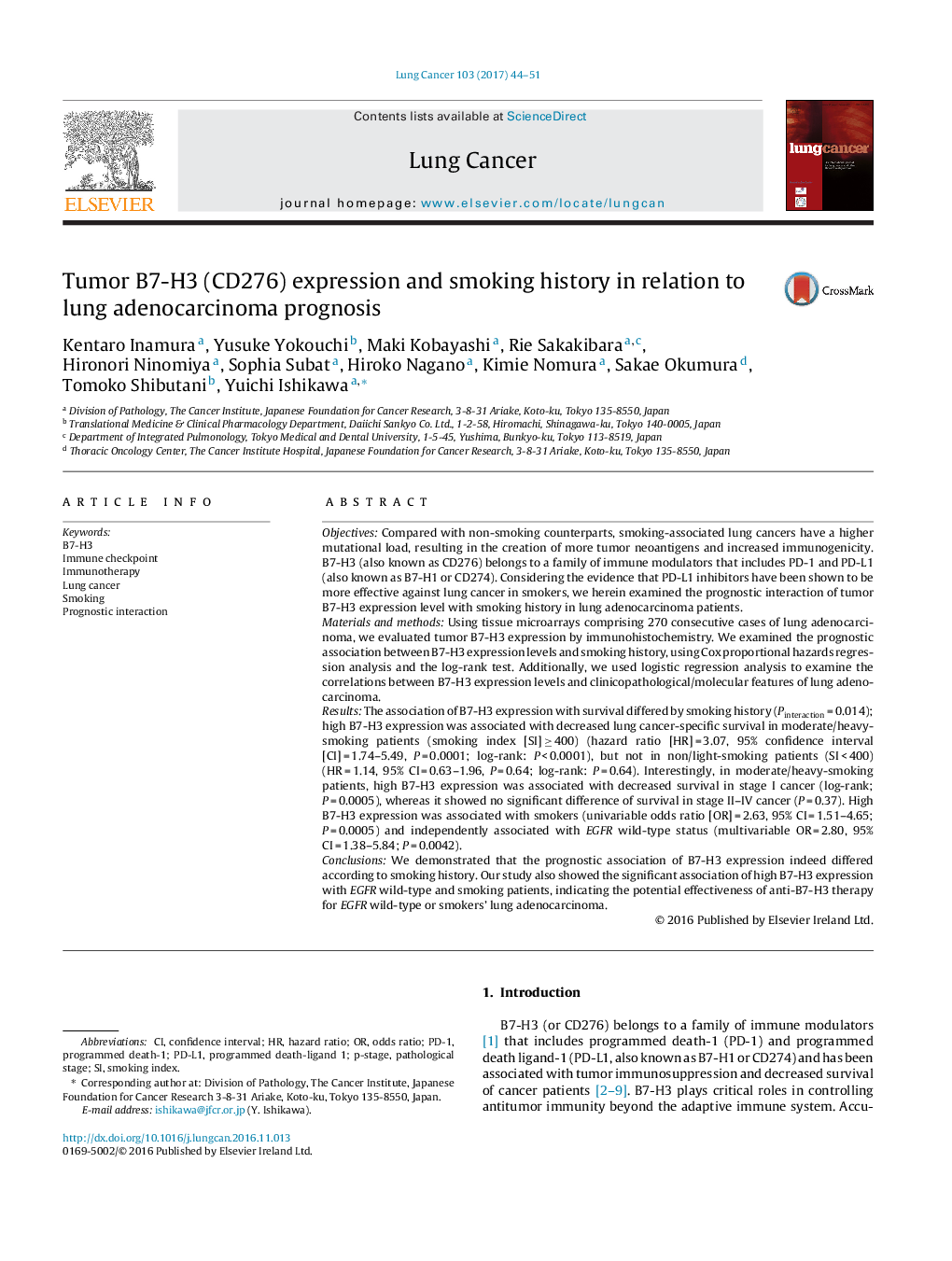| کد مقاله | کد نشریه | سال انتشار | مقاله انگلیسی | نسخه تمام متن |
|---|---|---|---|---|
| 5528442 | 1547964 | 2017 | 8 صفحه PDF | دانلود رایگان |

- We evaluated tumor B7-H3 expression by IHC in 270 lung adenocarcinomas.
- We demonstrated a significant prognostic interaction of B7-H3 with smoking history.
- In smoking patients, high B7-H3 expression was associated with decreased survival.
- In non-smoking patients, high B7-H3 expression was not associated with survival.
- High B7-H3 expression was associated with EGFR wild-type and smoking patients.
ObjectivesCompared with non-smoking counterparts, smoking-associated lung cancers have a higher mutational load, resulting in the creation of more tumor neoantigens and increased immunogenicity. B7-H3 (also known as CD276) belongs to a family of immune modulators that includes PD-1 and PD-L1 (also known as B7-H1 or CD274). Considering the evidence that PD-L1 inhibitors have been shown to be more effective against lung cancer in smokers, we herein examined the prognostic interaction of tumor B7-H3 expression level with smoking history in lung adenocarcinoma patients.Materials and methodsUsing tissue microarrays comprising 270 consecutive cases of lung adenocarcinoma, we evaluated tumor B7-H3 expression by immunohistochemistry. We examined the prognostic association between B7-H3 expression levels and smoking history, using Cox proportional hazards regression analysis and the log-rank test. Additionally, we used logistic regression analysis to examine the correlations between B7-H3 expression levels and clinicopathological/molecular features of lung adenocarcinoma.ResultsThe association of B7-H3 expression with survival differed by smoking history (Pinteraction = 0.014); high B7-H3 expression was associated with decreased lung cancer-specific survival in moderate/heavy-smoking patients (smoking index [SI] â¥Â 400) (hazard ratio [HR] = 3.07, 95% confidence interval [CI] = 1.74-5.49, P = 0.0001; log-rank: P < 0.0001), but not in non/light-smoking patients (SI < 400) (HR = 1.14, 95% CI = 0.63-1.96, P = 0.64; log-rank: P = 0.64). Interestingly, in moderate/heavy-smoking patients, high B7-H3 expression was associated with decreased survival in stage I cancer (log-rank; P = 0.0005), whereas it showed no significant difference of survival in stage II-IV cancer (P = 0.37). High B7-H3 expression was associated with smokers (univariable odds ratio [OR] = 2.63, 95% CI = 1.51-4.65; P = 0.0005) and independently associated with EGFR wild-type status (multivariable OR = 2.80, 95% CI = 1.38-5.84; P = 0.0042).ConclusionsWe demonstrated that the prognostic association of B7-H3 expression indeed differed according to smoking history. Our study also showed the significant association of high B7-H3 expression with EGFR wild-type and smoking patients, indicating the potential effectiveness of anti-B7-H3 therapy for EGFR wild-type or smokers' lung adenocarcinoma.
Journal: Lung Cancer - Volume 103, January 2017, Pages 44-51